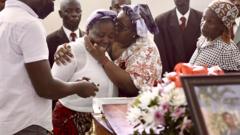In Mozambique’s capital, Maputo, a somber scene unfolded at a cemetery where children mourned the tragic loss of their friend, 16-year-old Antonio Juaqim. His life was cut short amid violent protests opposing the results of last month’s presidential election. Antonio was reportedly shot in the mouth, with the bullet exiting from the back of his head, a devastating detail shared by his uncle, Manuel Samuel.
The unrest stems from the outcome of the election, which saw the ruling Frelimo party, in power for nearly half a century, declaring victory with 71% of the vote for its candidate Daniel Chapo. In stark contrast, opposition candidate Venâncio Mondlane, who claimed the election was rigged, garnered only 20% and has since fled the country due to threats of arrest.
Mondlane has mobilized supporters through social media to protest against the election results. Following his call, nightly demonstrations across Maputo began on November 15, characterized by citizens banging pots and pans as a symbol of discontent. What began as a hopeful display of collective action turned tragic after police confrontations resulted in fatalities, including that of Antonio.
The atmosphere during Antonio’s funeral was heavy with grief, punctuated by a moving eulogy wherein friends remembered him as a beacon of hope. His death is part of a disturbing trend; reports indicate that around 40 individuals, including 10 children, have died in connection with the protests. Rights organizations are calling for accountability, yet police officials suggest the blame lies with protestors who they accuse of inciting violence.
Bernadino Raphael, commander of Mozambique’s police, expressed condolences but attributed the chaos to Mondlane's followers, suggesting that they used children as “shields” during the riots. Meanwhile, opposition leaders argue that police responses were excessively violent and intended to maintain the ruling regime's grip on power.
Analysts have noted a significant shift in public sentiment against Frelimo, particularly among youth who are increasingly frustrated by lack of economic opportunities. For many, the desire for independence has morphed from political liberation to economic empowerment.
Currently, Chapo maintains that Frelimo's victory was legitimate, with the party awaiting judicial outcomes regarding Mondlane's challenge. In a show of solidarity, Mondlane supporters also observed three days of mourning by pausing their vehicles and honking in tribute to the deceased.
As incidents like that of Antonio Juaqim and other young victims of police brutality continue to emerge, many youth in Mozambique express urgency for change within a political landscape fraught with tensions. With their futures at stake, these young people are hoping to break from the political legacies of the past in pursuit of a brighter tomorrow.
















